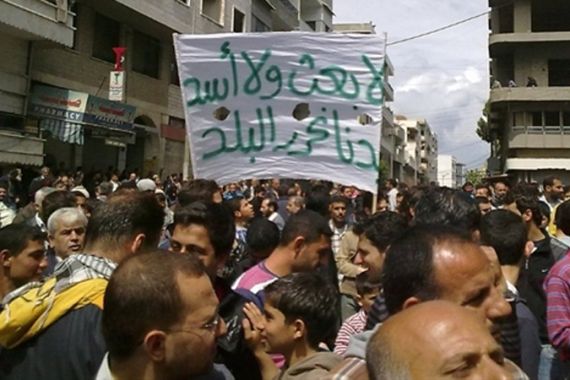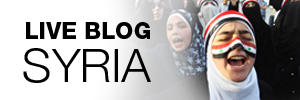Global pressure on Assad to end violence
UN secretary-general condemns violence against Syrian pro-democracy protesters as US and UK consider imposing sanctions.

As the Syrian government intensifies its crackdown against pro-democracy protesters, the international community steps up its pressure on president Bashar al-Assad to stop the bloodletting.
In a session on Tuesday, members of the UN Security Council discussed the uptick in violence, but failed to issue a collective statement.
Still, Ban Ki-moon, the UN secretary-general, condemned the violence against “peaceful protesters” and called on the Syrian government to respect the people’s rights to freedom of expression.
“I condemn, utterly, the continuing violence against peaceful demonstrators, most particularly the use of tanks and live fire that have killed and injured hundreds of people,” Ban said.
“It goes without saying that Syrian authorities have an obligation to protect civilians and respect international human rights. That includes the right to free expression and peaceful assembly.”
Susan Rice, the US ambassador to the United Nations, has also criticised the Syrian government for what she called the “abhorrent use of violence to quell protests.”
“President Assad is disingenuously blaming outsiders—at the same time seeking Iranian assistance to repress citizens,” she said.
The Syrian UN envoy rejected a call by the secretary-general to launch an independent inquiry into the deaths of people Ban has described as peaceful demonstrators.
“We can undertake any investigation by our own selves with full transparency … We have nothing to hide,” Bashar Ja’afari told reporters.
“We regret what’s going on, but you should also acknowledge the fact that this unrest and riots, in some of their aspects, have hidden agendas,” he said, adding that some foreign governments were trying to destabilise Syria.
‘Mulling sanctions’
Britain and the US have announced looking into the possibility for imposing sanctions on Syria to push it into halting the violence against protesters and respecting human rights.
Activists say about 400 people have been killed since the uprising against Assad’s 11-year rule began on March 15.
 |
According to a diplomat on the UN Security Council, France, Britain, Germany and Portugal have circulated a draft media statement to the other members of the council, urging them to strongly condemn the violence against peaceful demonstrators.
As the global leaders met in New York, Amnesty International, the UK-based human rights organisation, called on them to refer the situation in Syria to the prosecutor of the International Criminal Court, arguing that the body should investigate the allegations of crimes against humanity, including murder and torture.
“The Syrian government is clearly trying to shatter the will of those peacefully expressing dissent by shelling them, firing on them and locking them up,” Salil Shetty, Amnesty International’s Secretary General, said.
“President al-Assad and those around him have to understand that their actions will have consequences, namely that if they gun down their own citizens the international community will hold them individually criminally responsible before the ICC or national courts of states exercising universal jurisdiction.”
Edging towards intervention
The leaders of France and Italy used strong language during a joint news conference in Rome on Tuesday to condemn the violence in Syria.
“We issue a strong call on the authorities in Damascus to end the violent repression against what are peaceful demonstrations,” Silvio Berlusconi, the Italian prime minister, said.
For his part, Nicolas Sarkozy, the French president, reaffirmed that no intervention in Syria would be possible without a UN Security Council resolution.
Separately, William Hague, the UK foreign secretary, called for an end to the “violent repression” of protests, saying that British officials were working with their allies on possible further measures against Syria.
“The United Kingdom is working intensively with our international partners to persuade the Syrian authorities to stop the violence and respect basic and universal human rights to freedoms of expression and assembly,” Hague told the British parliament.
“This includes working with our partners on the United Nations Security Council to send a strong signal to the Syrian authorities that the eyes of the international community are on Syria, and with our partners in the European Union and the region on possible further measures.”
Britain has been hesitant to support a UN resolution on the situation in Syria, but said on Tuesday that its reluctance may fade if the repression continues.
Meanwhile, the US state department has ordered embassy family members and some non-emergency personnel to leave Syria, after an earlier travel warning telling US citizens to leave the country due to escalating violence.
A US official said on Monday the US administration was considering sanctions against senior figures in Assad’s government.
The measures, which could freeze those officials’ assets and ban them from doing business in the US, would probably come in the form of an executive order signed by the US president, the official said.
The US response so far has been limited to tough words but little concrete action against the Syrian government, in contrast to its role in a NATO-led air campaign against Muammar Gaddafi, the Libyan leader.
 |
“The brutal violence used by the government of Syria against its people is completely deplorable,” Tommy Vietor, a White House spokesman, said on Monday.
Syria is already under US sanctions, aid restrictions and export bans, due to its presence on the US list of state sponsors of terrorism.
Barack Obama, in a statement on Friday, told Syria that its bloody crackdown on protesters “must come to an end now” and accused it of seeking Iranian help to repress its people.
Closer to home, hundreds of demonstrators rallied on Tuesday in front of the Syrian embassy in Cairo, calling for Assad’s resignation. The majority of the 500 protesters were of Syrian origin, joined by some Egyptians.
“We are here just like to tell Bashar al-Assad either step down, stop the bloodshed, stop it. Everybody’s dying in there, either step down, let us take control, let the people live, make people free,” Hazem Hakim, a Syrian national, said.
Many of the protesters refused to speak in front of a camera or give their names in fear for the safety of their families who currently reside in Syria.
Turkey has increased diplomatic pressure on Syria to halt its crackdown on protesters, a day after a protest outside the Syrian embassy in the Turkish capital, Ankara.
Recep Tayyip Erdogan, Turkish prime minister, called Assad on Tuesday to press for reform, while Turkey’s ambassador to Damascus met Adel Safar, the Syrian prime minister, to express Turkey’s “deep concern and sorrow over loss of many lives,” the prime minister’s office and Turkish media reported.
Erdogan, who has close ties with Assad, had conferred with Obama about the turmoil on Monday.
The violence also is fuelling opposition by human rights groups and a growing number of governments to Syria’s all-but-certain election to the 47-nation Human Rights Council. It is one of four candidates selected to fill four Asian seats and Syria can lose only if diplomats find another candidate to enter the race or it fails to win a majority of votes in a May 20 election in the 192-member General Assembly.